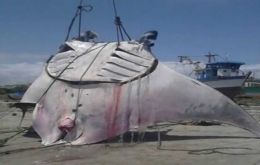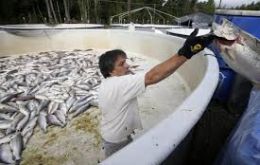MercoPress. South Atlantic News Agency
Environment
-
Friday, May 1st 2015 - 05:29 UTC
Argentina and Chile coordinate joint scientific research in South Atlantic

Outstanding researchers and scientists from Argentina and Chile in the fields of marine sciences, fisheries Antarctica and technology innovation met this week in Buenos Aires for a day's work coordinating the scientific efforts of both countries.
-
Wednesday, April 29th 2015 - 09:33 UTC
Kathmandu is estimated to have moved 3 meters to the south, because of Nepal tremor

The tremor which struck Nepal on Saturday, April 25, killing more than 5,500 people so far, may have caused a land area around the capital Kathmandu to budge by several meters, experts say. The estimate is about 3 meters southward, according to initial analysis of seismological data obtained from sound waves which travel through Earth after an earthquake, said University of Cambridge tectonics expert James Jackson.
-
Wednesday, April 29th 2015 - 01:18 UTC
Falklands confident of its oil industry safety regime and environment protection commitment

The Falkland Islands maintain strong regulatory oversight on all oil and gas operations and its offshore safety regime is based on the North Sea’s Safety Case regulatory structure, recognized as one of the highest standards in the world, said the Falklands' government in a release following concerns related to technical issues on the rig Eirik Raude, currently operating in the South Atlantic.
-
Tuesday, April 28th 2015 - 08:05 UTC
IAATO 2015 convention starts today in Rotterdam - Falkland Islands Tourist Board Management in Attendance

Tony Mason, Director, International Communications and Stephanie Middleton, Interim CEO of the Falkland Islands Tourist Board are in Rotterdam, Netherlands this week attending the IAATO conference where key issues affecting the region will be discussed.
-
Tuesday, April 28th 2015 - 05:04 UTC
New York dims lights in high buildings to help birds' migration

The state of New York is to turn off non-essential lights in state-run buildings to help birds navigate their migratory routes in spring and autumn. Migrating birds are believed to use stars to navigate but they can be disorientated by electric lights, causing them to crash into buildings.
-
Monday, April 27th 2015 - 21:29 UTC
Giant 1.000 kilos manta ray caught by Peruvian fishermen

A giant manta ray of approximately 1.000 kilos was caught by Peruvian unsuspecting fishermen operating at La Cruz inlet, north of the country close to the Ecuadorian border, according to Lima media. Erick Cruz Guerrero, 22 was the young crew member that finally captured the giant manta ray which had to be unloaded with a crane.
-
Monday, April 27th 2015 - 10:32 UTC
Chile could lose 8% of salmon production at hatcheries because of Calbuco eruption

Chile's Association of Salmon producers (SalmonChile) reported destruction of hatcheries and heavy losses in production in the industry which operates numerous freshwater facilities in the area directly affected by the eruption of the Calbuco volcano.
-
Monday, April 27th 2015 - 06:58 UTC
No end in suffering for Nepal: officially 3.220 dead and powerful aftershocks

At least 3,218 people are now known to have died in a massive earthquake which hit Nepal on Saturday, say officials. Rameshwor Dangal, head of Nepal's disaster management agency, said another 6,500 people had been injured. Dozens of people are also reported to have been killed in neighboring China and India.
-
Saturday, April 25th 2015 - 06:19 UTC
Malvinas' oil rig drilling 'technical problem' triggers strong concern release from Argentina

Argentina's Foreign Ministry expressed concerns on Friday over the failure in the blow-out preventer, BOP, valve of the “Isobel Deep” exploration well currently being drilled to the north of the Falklands/Malvinas Islands, as reported by Falkland Oil and Gas Limited (FOGL).
-
Saturday, April 25th 2015 - 05:58 UTC
Volcano ashes fog Buenos Aires and blanket several Patagonian provinces

The eruption of Chile’s Calbuco volcano has resulted in a cloud of ash beginning to spread on Friday into the City of Buenos Aires while the alert in southern cities of Argentina remains.
